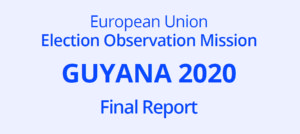Home Top Stories Tainted Region 4 count compromised 2020 polls in Guyana – EU EOM
…says senior GECOM officials violated country’s electoral laws
Following a largely uncontested and transparent tabulation of the March 2 votes in nine of Guyana’s 10 regions, the electoral process was abruptly derailed into chaos and confusion amidst obstruction tactics by election officials in decisive Region Four (Demerara-Mahaica) – the country’s largest voting district.
This is according to the European Union Elections Observation Mission (EU EOM) in its final report on Guyana’s contentious elections, held over three months ago and which is yet to produce credible results. 
According to the EU EOM, voting and counting were well managed all over the country, as was the tabulation of results in nine of Guyana’s 10 regions. However, the tabulation process was abruptly stalled in Region Four, before being rushed through in a deliberately non-transparent manner.
“…the integrity of the entire electoral process was seriously compromised by the non-transparent and non-credible tabulation of results in the largest and decisive Region 4 by senior GECOM officials acting in blatant violation of the law and High Court orders issued in this regard,” the mission said.
Embattled Region Four Returning Officer (RO) Clairmont Mingo had declared two sets of contentious results. The first, on March 4, was annulled by the High Court; and the second, on March 13, lacked transparency and blatantly violated the court order.
The EU EOM contend that the results declared by the RO are not credible, and surmised that “GECOM abdicated its constitutional duty to take all actions necessary to ensure compliance with the law and oversee a proper tabulation process.”
Tamper
In fact, the ongoing National Recount has unearthed proof that Mingo had heavily inflated the regional votes in favour of the APNU/AFC Coalition, to give them an overall landslide lead over the Opposition People’s Progressive Party/Civic.
“Among many other oddities suggesting that they have been grossly tampered with, without enough attention given to overall coherence, these results imply that the total number of electors who cast a ballot – valid or invalid – differed by 6,123 between the General and the Regional Elections. This is technically impossible, since electors mark their choice for both elections on a single piece of ballot paper, two parts of which are detached only during the count,” the EU EOM outlined.
According to the EU Mission, throughout the process, both the RO and GECOM staff deployed all possible efforts to make sure no stakeholder would ever be able to independently examine the Statements of Poll to ascertain the results. And
following a tabulation process that was rushed through in deliberate opacity, there were consistent efforts to conceal other sources of verification of the declared results: not a single SOP in the possession of the RO, the CEO and APNU+AFC was made available to public scrutiny,” the foreign observation mission stated.
Further, the EOM pointed out that requests for access to SOPs in possession of the two main political parties were answered only by the PPP/C.
The EOM’s final report, which was handed over to GECOM Chairman Justice Claudette Singh on Friday by Head of the EU Delegation, Ambassador Fernando Ponz Canto, covers the period up to the immediate post-election events, since the EU observers were unable to return for the National Recount as a result of Guyana closing its airports due to the COVID-19 pandemic.
Nevertheless, the Observation Mission concluded that, overall, the elections were competitive and contestants could campaign freely, even though the process took place in a deeply polarised environment. It added, too, that legal uncertainty, unregulated political finance, biased state media, and lack of transparency in the administration of elections characterised the pre-election context.
Voting process
Moreover, the EU observers noted that the March 2 voting process was well managed and largely peaceful, allowing voters to exercise their franchise freely.
“Both APNU+AFC and PPP/C agents were present in nearly all polling stations observed by the mission. They seemed generally well prepared and equipped, contributing to the transparency of the process without exerting undue influence on voters. Newer political parties and citizen observers were rarely represented. A large majority of polling station officials and party agents were women,” the mission observed in its report.
This comes on the heels of the Coalition now claiming that votes were cast on March 2 in the name of dead and migrated voters – something which many stakeholders, including other international observers, have disputed.
In fact, even Ambassador Canto, head of the EU Delegation here in Guyana, said in a recent interview that it was “impossible to cheat” on elections day, given the processes in place at the polling station.
The EU EOM was the largest mission, having deployed 55 observers to observe the opening, polling, counting and tabulation processes in all 10 regions. They visited 201 polling stations and assessed the polling process very positively, with the exception that some procedural safeguards were not consistently applied.
To this end, the mission made 26 recommendations to improve future electoral processes.
These include eight priority recommendations suggesting a review and consolidation of the fragmented election legislation; launching of a consultation process to overhaul the composition and functioning of GECOM; development of effective legislation to regulate political finance; fostering of transparency and accountability in online and offline campaigning; transforming the state-owned media into a genuine public service broadcaster; adopting clear, written procedures for transmission and tabulation of election results; accompanying any declaration of results by simultaneous publication of detailed polling station results and digital copies of all Statements of Poll; and establishing comprehensive election dispute resolution system.
